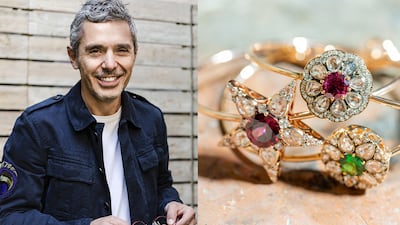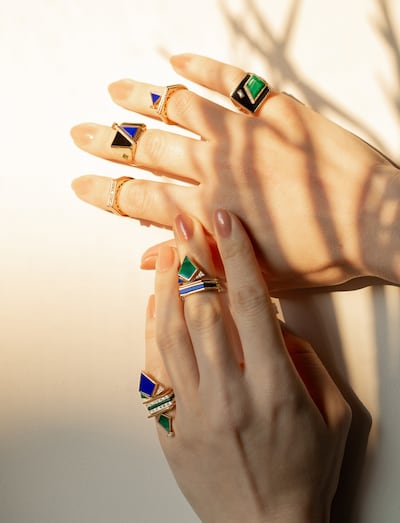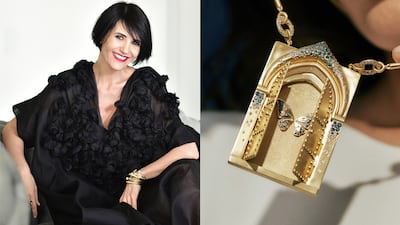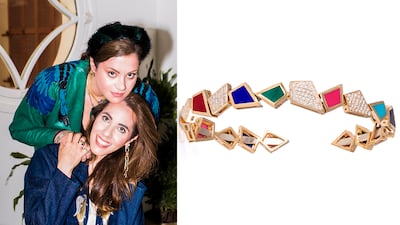On August 4, 2020, Lebanese jewellery designer Selim Mouzannar was on a sailing boat in the Greek islands when he received a call from his wife. Their Beirut house had been badly damaged, with the doors and windows blown out, both their jewellery shops had been destroyed, and his daughter, Ranwa, had been badly injured as she was closing up one of the shops.
Fine jewellery is one of Lebanon’s biggest exports. Many workshops, jewellery boutiques and homes are located in the Beirut port district where, three years ago, 2,750 tonnes of ammonium nitrate exploded in a fire. At least 218 people lost their lives, and 77,000 structures were damaged.
jewellery designer
Mouzannar’s was one among thousands of families and businesses affected. However, like many fellow Lebanese creatives, he refused to let it get in the way of life.
“My family wanted to leave afterwards, but I decided to keep working, keep creating and go forward. To create beauty is our main resistance to counteract violence,” says Mouzannar, whose signature collection Beirut Rosace is his tribute to the city.

The third generation of a family of jewellers originally from Damascus, he’s proud of being a Beiruti and talks often of the resilient Lebanese spirit.
Fellow jewellers, the Nawbar sisters Dima and Tania, who are behind L’Atelier Nawbar, were at their grandmother’s funeral on that fateful day in August 2020, having left Tania’s children with friends who lived near the port.
jewellery designer, L'Atelier Nawbar
Tania recalls: “At 5.30pm, I just got this feeling that I had to pick up my kids and go home.” The sisters have houses that are a five-minute walk from the port. “I picked them up, we got home at six and the blast was at 6.04pm.” The sisters’ homes lay shattered around them, a friend was badly injured and, sadly, one of their company's jewellery artisans died in the aftermath.
L'Atelier Nawbar employs 150 people, many of whom were apprehensive about their future. “A lot of businesses left Beirut and our team was fearful we would pick up and leave for Dubai,” says Tania, who launched the business with her sister in 2011.
“But we couldn’t just get up and leave; this is our family legacy,” Dima says. They are the fourth generation in their family to work in the jewellery trade.
At present, they’re navigating the collapse of the economy with restricted access to credit and cash, and Tania admits: “We’ve been forced to become businesswomen and bankers.”
However, they’ve rebuilt their homes and expanded their collections. They are also showing at Harrods in London this month; opening a second flagship store in Riyadh next month; and hosting pop-ups at Bloomingdale’s in Dubai and Bahrain this autumn.

Their new collection, Fragments, was created in the aftermath of the blast as part of the healing process, and is inspired by the colourful shattered glass from the old buildings of Beirut reassembled in jagged shapes. Putting pieces back together – in life and in work – was “very therapeutic”, Dima says.
Jeweller Nada Ghazal was in her Beirut office at the time of the explosion, which all but destroyed her workshop as well as her new, yet-to-open flagship outlet. “The whole space turned grey after the first explosion and a few seconds later, the bigger blast hit us. Shards of glass, metal and wood and dust filled the air,” she says.
“I remember looking around not knowing what had happened. The office had shattered over our heads, the workshop equipment was lying broken everywhere. I can't forget our screams amid the alarm, searching for each other in the grey dust to make sure we were all OK.
“It left me and many others with a terrible guilt because we had survived,” says Ghazal, who lost a lifetime of work, but says that feels like nothing compared to others.

Miraculously her team escaped unharmed, and she slowly rebuilt her workshop. “After the blast and all the surreal events we have been going through, I thought I was losing my city, so I created a collection called My Muse to translate different aspects of what I loved most about Beirut, which I wanted to share with the rest of the world,” she says.
After two years, Ghazal decided to grow the business internationally by relocating to London where she’s putting her children through school. She also plans to open a boutique in the city, while still retaining her business and workshops in Beirut.
Her latest collection is called Doors of Opportunity that, she says, is “inspired by the symbolism of doors and the magic they hold for new beginnings”. An apt metaphor, then, for what happened in Lebanon and the precious Beiruti mindset of always looking to the future.

